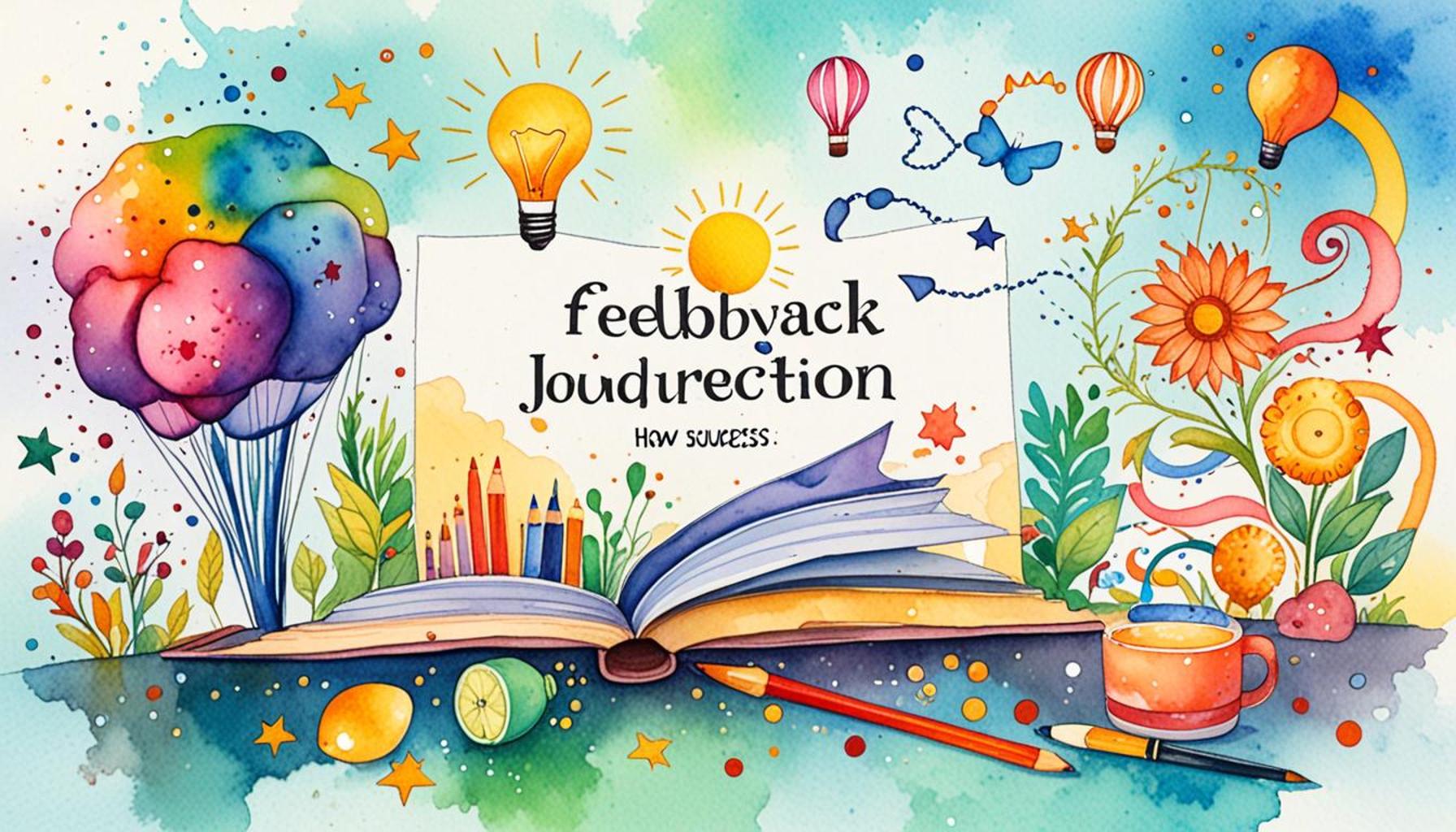Unlock Growth Mindset The Power of Constructive Feedback

In the pursuit of personal and professional development, the role of feedback cannot be overstated. It serves as a powerful tool for growth, guiding individuals to reflect, adapt, and enhance their abilities. Within the broader framework of growth mindset techniques, understanding and embracing constructive feedback becomes paramount.
Constructive feedback not only highlights areas for improvement but also reinforces the belief that skills can be developed over time. This perspective shifts one’s focus from a fixed mindset—where abilities are seen as static—to a dynamic approach that fosters continuous learning. Consider these essential points:
- Enhances Self-awareness:Feedback reveals blind spots and helps individuals identify strengths and weaknesses.
- Encourages Resilience:A positive response to feedback promotes persistence in the face of challenges.
- Facilitates Communication:Open dialogue about performance fosters better relationships in both personal and professional settings.
- Drives Innovation:Feedback can spark creativity and lead to novel solutions and ideas.
- Supports Goal Setting:Constructive insights can help refine objectives and chart a clear path to success.
As we delve deeper, this article will unveil the Top 5 Benefits of Constructive Feedback within the growth mindset philosophy, equipping you with insights that can transform your approach to feedback and personal development.
SEE ALSO: Click here to read another article
Top 5: The Importance of Constructive Feedback in Developing a Growth Mindset
Understanding the value of constructive feedback is crucial in fostering a growth mindset. Constructive feedback not only helps individuals recognize areas for improvement but also enhances motivation and encourages learning. In this article, we will rank the top five aspects of constructive feedback and its pivotal role in developing a growth mindset. By delving deeper into each facet, we aim to paint a comprehensive picture of how feedback intertwines with personal and professional development.

5. Fostering Resilience
Constructive feedback plays a critical role in building resilience in individuals. This resilience is akin to a sturdy bridge that enables people to cross the turbulent waters of challenges and setbacks. When one receives feedback, it often highlights both strengths and weaknesses. Rather than seeing criticism as a personal attack, those with a growth mindset view it as an opportunity to grow and learn. This attitude is what allows them to persevere in the face of adversity and to transform obstacles into learning experiences.
- Resilience allows individuals to bounce back from challenges. By embracing a constructive stance, a person’s setbacks transition from roadblocks to stepping stones leading to success.
- Feedback leads to self-awareness, which is essential for improvement. Through feedback, individuals gain an understanding of their performance that is otherwise inaccessible.
- Embracing constructive criticism fosters a willingness to evolve. Those adept in leveraging feedback aren’t afraid of pushing their limits, which ultimately leads to personal growth.
Consider this practical example: in the world of athletes, those who constantly receive coaching feedback tend to develop better strategies to handle competition pressure and to improve their techniques efficiently. Such athletes often view losses as learning opportunities, propelling them to higher performance levels.
4. Enhancing Self-Awareness
Feedback acts as a mirror reflecting our actions, behaviors, and results. This reflection is integral for self-awareness, which is a cornerstone of a growth mindset. By understanding how others perceive our work and behavior, we can identify gaps in our performance. Regular check-ins with peers or supervisors provide insights that individuals may not be conscious of, thus making feedback invaluable for guiding personal and professional development.
Feedback creates a dialogue with oneself, prompting reflection on questions such as: How do others see my contributions? Where do I shine brightest, and where do I dim? This conversation with oneself leads to deeper insights and adjustments in behavior.
- Recognition of strengths that can be further developed. Identifying where one naturally excels serves as a launchpad for further success.
- Identification of weaknesses that require improvement. Constructive feedback illuminates areas needing development long before they become critical issues.
- A clearer understanding of one’s impact on others. Understanding how actions and words affect peers can dramatically enhance professional and personal relationships.
In a corporate context, for example, self-aware leaders can better navigate complex situations by interpreting feedback. They understand how their decisions impact their team members, leading to more thoughtful and inclusive leadership styles.
3. Encouraging Open Communication
Feedback fosters an environment where open communication thrives. An open-door culture regarding feedback is crucial in dismantling communication barriers, fostering collaboration, and building mutual respect within teams. When individuals feel comfortable sharing and receiving feedback, it promotes a culture where ideas flow freely and innovation blossoms. This culture of openness is essential for both personal growth and the broader growth of organizations.
The benefits of encouraging open communication include growing pains and successes shared within a team, which lead to stronger bonds and collective progress. When teams communicate effectively, members are more likely to share ideas without hesitation, knowing that feedback is constructive rather than punitive.
- Strengthening relationships within teams. Open lines of communication build trust and dependence, integral for a cohesive group dynamic.
- Encouraging collaboration leading to better outcomes. Teams that communicate openly often innovate faster and more effectively, resulting in superior results.
- Facilitating a network of support that nurtures growth. Through open dialogue, individuals can rely on each other for feedback, motivation, and encouragement, creating a rich soil for growth.
Consider a tech company developing new software: if open communication is prevalent, developers can quickly share insights, correct mistakes, and innovate solutions more readily, leading to more efficient and effective product development.
2. Promoting Continuous Learning
One of the most significant advantages of constructive feedback is its ability to foster a culture of continuous learning. Learning through feedback becomes a systemic process, embedded into the DNA of everyday activities. When individuals receive feedback, they have the opportunity to reflect on their work, learn new skills, and adapt their approaches. This mindset leads to lifelong learning, encouraging individuals to seek out new challenges and experiences, further solidifying their growth mindset.
- The idea that skill development is ongoing. There is always room for growth and improvement, regardless of one’s current proficiency level.
- Understanding that mastery comes through effort. With every feedback cycle comes a chance to practice, refine, and master a skill.
- Valuing learning as an essential part of life. A commitment to learning ensures individuals remain curious and passionate about their fields.
In academia, for example, continuous learning through feedback can result in better research outcomes. Researchers better equipped to handle criticism find innovative ways to approach problems, leading to groundbreaking discoveries.
1. Building Confidence
At the top of the list is the powerful relationship between constructive feedback and building confidence. When feedback is given in a positive and constructive manner, it helps individuals validate their strengths and capabilities, establishing a strong foundation of self-assurance. This validation builds self-confidence, leading individuals to take risks, explore new opportunities, and ultimately maximize their potential.
Confidence thrives on the nourishment of positive and balanced feedback. Just as a well-tended garden flourishes, an individual continuously supported by constructive feedback blossoms into a confident and resilient form.
- Reinforcement of abilities encourages individuals to take on new challenges. Seeing one’s strengths reinforced provides the courage to venture into unknown territories.
- Positive feedback balances criticism, creating a growth environment. This balance empowers individuals to receive critique without feeling discouraged, making them more adaptable and open to change.
- Success stories can motivate and inspire others to embrace feedback. Knowing real outcomes of feedback-driven success can galvanize teams to bravely face criticism and learn from it.
In artistic fields, such as music or painting, confidence built through constructive feedback allows artists to experiment fearlessly with new styles and techniques, often leading to creative breakthroughs.
In conclusion, understanding the importance of constructive feedback is vital for the development of a growth mindset. It equips individuals with the tools necessary for resilience, self-awareness, communication, continuous learning, and confidence. By embracing feedback, we can encourage a culture that not only values improvement but also celebrates the dynamic and iterative journey of growth itself. Through a deeper examination of these aspects, it becomes clear that constructive feedback is not just a tool for development but a fundamental pillar supporting the thriving of both the individual and the collective.
| Category | Key Features |
|---|---|
| Personal Development | Constructive feedback creates opportunities for self-reflection and personal growth. This practice encourages individuals to step outside their comfort zones and embrace new challenges. |
| Enhanced Learning | Feedback provides critical insights into what one is doing well and what needs improvement. This guidance aids in refining skills and advancing knowledge, ultimately promoting lifelong learning. |
| Increased Motivation | When feedback highlights strengths while addressing areas for improvement, it turns challenges into motivational tools rather than discouragements, fostering resilience and determination. |
| Team Dynamics | In a collaborative environment, constructive feedback encourages open communication, trust, and stronger relationships among team members, facilitating a more cohesive and productive atmosphere. |
In exploring the importance of constructive feedback in nurturing a growth mindset, one discovers that it is not merely about offering opinions but rather instilling a belief in potential and possibility. The process begins with personal development; through receiving feedback, individuals are prompted to engage in self-assessment, enhancing their understanding of both strengths and weaknesses. This engagement is crucial as it lays the foundation for meaningful progress.Moreover, constructive feedback acts as a catalyst for enhanced learning. By developing a feedback-rich environment, individuals are given pathways to identify areas for improvement and work towards them with a clear focus. The ability to hone specific skills and acquire new knowledge becomes less intimidating when supported by constructive criticism.Another pivotal aspect is the increased motivation it brings. When individuals see their efforts recognized, even in areas needing improvement, they feel empowered. The duality of praise and constructive suggestions transforms challenges into stepping stones, igniting a desire to persevere and conquer obstacles ahead.Finally, one cannot overlook the impact on team dynamics. Constructive feedback enhances collaboration, allowing for a culture of open communication and trust. Such synergies enrich professional relationships and yield a more cohesive organizational atmosphere, leading to innovative solutions and collaborative successes.In sum, the journey towards cultivating a growth mindset is profoundly influenced by constructive feedback, shaping not only individual paths but also collective experiences in growth and improvement.
CHECK OUT: Click here to explore more
Frequently Asked Questions on Constructive Feedback and Growth Mindset
What is constructive feedback and how does it differ from regular feedback?
Constructive feedback is a type of feedback that is designed to help individuals improve their performance and develop their skills. Unlike regular feedback, which may simply highlight what was done right or wrong, constructive feedback focuses on providing specific, actionable suggestions that guide individuals toward improvement. It is often framed in a positive manner to encourage a growth mindset.
How does constructive feedback contribute to a growth mindset?
A growth mindset is the belief that one’s abilities and intelligence can be developed with effort and practice. Constructive feedback plays a crucial role by offering insights and perspectives that individuals might not see on their own, emphasizing the process of learning over the outcome. This type of feedback helps individuals to understand mistakes as opportunities for growth rather than failures, reinforcing a mindset that thrives on learning.
Can anyone give constructive feedback or does it require special skills?
While anyone can offer feedback, giving effective constructive feedback does require certain skills and awareness. It involves being observant, empathetic, and knowledgeable about the individual’s goals and challenges. Practicing clear communication, maintaining a respectful tone, and focusing on facts rather than personal opinions are all key components of delivering feedback that fosters growth.
What are some common misconceptions about receiving feedback?
One common misconception is that feedback is always negative and a sign of failure. However, constructive feedback is intended to be a tool for personal and professional development, not criticism. Another misconception is that feedback should be accepted without question. In reality, it’s important to engage with feedback actively, seeking clarification if needed, and using it constructively to foster improvement.
How can organizations foster an environment conducive to constructive feedback?
Organizations can foster an environment where constructive feedback thrives by encouraging open communication, offering regular training on feedback delivery and reception, and establishing a culture of trust and mutual respect. Leaders should model the behavior by both giving and receiving constructive feedback positively, which sets a standard for the entire team and reinforces the importance of continuous development.
SEE ALSO: Click here to read another article
Conclusion
In exploring the pivotal role of constructive feedback in fostering a growth mindset, it becomes apparent that this approach acts as a cornerstone in personal and professional development. Through constructive feedback, individuals can identify areas for improvement, build on strengths, and achieve their potential. This mechanism not only enhances self-awareness but also cultivates resilience in the face of challenges, encouraging individuals to view setbacks as opportunities for growth rather than insurmountable barriers.
The process of providing and receiving constructive feedback cultivates a culture of continuous learning and improvement. By focusing on actionable insights and specific examples, feedback becomes a tool for empowerment rather than criticism. This facilitates a deeper understanding and motivation to embrace change, ultimately driving progress and innovation.
Reflecting on the key takeaways, it is evident that a growth mindset thrives in environments where feedback is welcomed and valued. Educators, managers, and leaders can play a crucial role by fostering open communication, providing transparent and honest evaluations, and encouraging experimentation and creativity. Such an environment not only nurtures individual growth but also contributes to the collective success of teams and organizations.
In essence, harnessing the power of constructive feedback is essential for nurturing a growth mindset. As individuals become more adept at embracing feedback, they open the door to new possibilities and discoveries. For those eager to delve deeper into growth mindset techniques, this subject invites further exploration and reflection, offering the potential for transformative outcomes in both personal and collective spheres.


